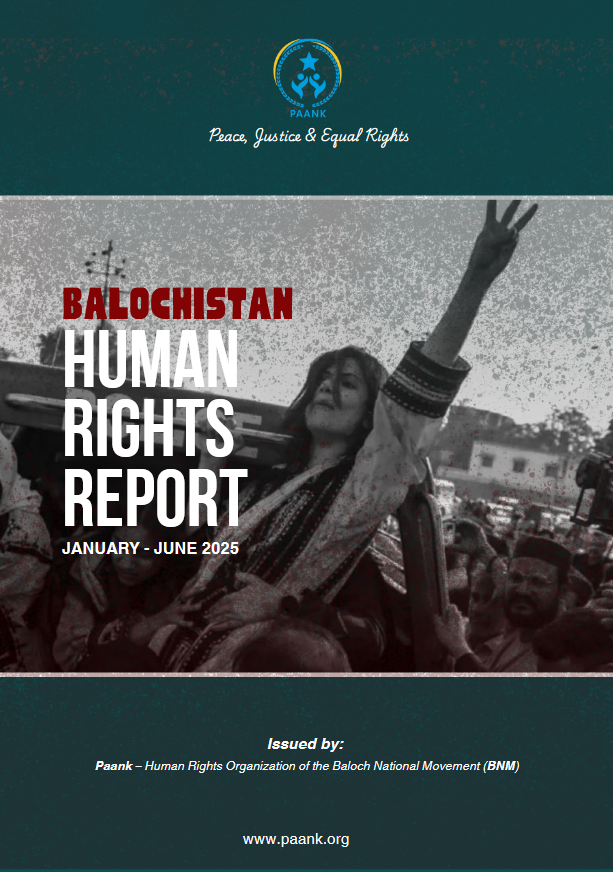Overview
Between January and June 2025, Balochistan witnessed an alarming escalation in grave human rights violations. Enforced disappearances,
extrajudicial killings, torture, and systematic targeting of civilians, especially students, journalists, and activists defined this period.
These abuses reflect a deliberate and coordinated campaign of repression by Pakistani military forces, including the Pakistan Army, Frontier Corps (FC), and intelligence agencies such as the Inter- Services Intelligence (ISI) ,Military Intelligence (MI) and the Counter Terrorism Department (CTD).
In many cases, these violations were carried out with the involvement of intelligence-backed death squads, operating with impunity under state protection.
Between January and June 2025, the Pakistani state intensified its crackdown on peaceful dissent in Balochistan by targeting prominent members of the Baloch Yakjehti Committee (BYC). Dr. Mahrang Baloch, Beebarg Baloch, Bebow Baloch, Gulzadi, Sibghat Ullah, and several other BYC leaders were detained under fabricated charges following their continued advocacy against enforced disappearances and extrajudicial killings. Despite national and international condemnation, these activists remain incarcerated without fair trial, in conditions that raise serious concerns about due process and political persecution.
Statistical Summary
Type of Violation Number of Cases
Enforced disappearances 785
Torture survivors released 261
Extrajudicial killings 121
From January to June 2025, Balochistan continued to experience severe human rights violations. PAANK recorded 785 enforced disappearances, 261 released survivors of torture, and 121 extrajudicial killings. These statistics point to a disturbing trend of systemic violence, repression, and abuse targeting civilians across the region. The scale and consistency of these violations indicate a coordinated policy of silencing dissent. Urgent international attention and accountability measures are needed to address the ongoing crisis.
Major Incident Highlights
1. Enforced Disappearances
Mass Abductions: A total of 785 cases of enforced disappearances were documented across 18 districts, including
major urban centers such as Karachi and Islamabad.
Tactics Used: Victims were abducted without warrants, often in front of witnesses, and held incommunicado under severe torture.
Families remain uninformed of their whereabouts.
Hotspot Districts: Kech, Awaran, Gwadar, Quetta, Khuzdar, and Mastung recorded the highest number of disappearances.
Targeting Students: A rising trend of abductions from university campuses and peaceful protest sites was observed, particularly
involving Baloch students in Karachi and Islamabad.
Criminalization of Activism: Peaceful figures like Dr. Mahrang Baloch including the leaders and members of the Baloch Yakjehti Committee (BYC) were arrested under fabricated charges, including under the Maintenance of Public Order (3MPO) law and the Anti-Terrorism Act
2. Extrajudicial Killings
Pattern of Execution: At least 121 individuals were executed without a judicial process. Many were previously subjected to enforced disappearance, and their mutilated or bullet-ridden bodies were later dumped.
Staged Encounters: The state frequently labeled victims as “militants” and claimed false encounters, especially in Barkhan, Panjgur, Dukki, and Awaran districts.
Child Victims: Cases such as 12-year-old Sahil Baloch and Nehmat Baloch, both killed during peaceful protests, highlight the indiscriminate use of lethal force.
Targeting Journalists: Journalist Abdul Latif Baloch was shot dead inside his home in May by death squad members.
Psychological Toll: The suicide of Aman Ullah Baloch, following persistent harassment by security forces, underscores the mental trauma inflicted by systematic repression.
3. Emerging Patterns of Abuse
Execution of Formerly Disappeared Person
- A rising number of extrajudicial killings involve individuals previously reported as disappeared.
This tactic appears aimed at:
- Erasing evidence of enforced disappearances
- Undermining legal advocacy by victims’ families
- Framing state violence as counterterrorism
Death Squads and Paramilitary Militias:
State-backed militias continue to conduct attacks, including grenade assaults on civilian homes (e.g., in Tump).
These squads operate with full impunity, spreading fear across the civilian population.
Suppression of Dissent:
Authorities responded violently to peaceful protests, particularly near the University of Balochistan, where security forces fired live ammunition and confiscated bodies from sit-ins.
Internet blackouts and digital surveillance were used as tools to silence collective mobilization and public discourse.
Human Rights Analysis
The magnitude and intensity of these abuses suggest a state-directed campaign to:
- Silence political opposition
- Suppress Baloch identity and activist
- Maintain militarized control over the region through fear and violence
Those targeted include peaceful demonstrators, students, academics, laborers, and members of the press. By orchestrating fake encounters and criminalizing dissent, the state attempts to legitimize its actions and avoid accountability.
Legal mechanisms have failed to offer protection or redress, reinforcing a culture of impunity.
Conclusion
The first half of 2025 has deepened the human rights crisis in Balochistan. Enforced disappearances, extrajudicial killings, torture, and state-sponsored propaganda constitute a systematic assault on the civilian population. The targeting of intellectuals, youth, and journalists demonstrates a deliberate effort to crush the region’s sociopolitical fabric.
Appeal to the International Community
Paank urgently calls on international human rights organizations, foreign governments, and global civil society to take immediate and concrete steps:
- Launch independent investigations into enforced disappearances and extrajudicial executions in Balochistan.
- Demand the unconditional release of all political prisoners, student activists, and unlawfully detained individuals.
- Pressure the Pakistani state to repeal draconian legislation, such as the 3MPO and the 2025 Anti-Terrorism Amendment Bill.
- Reevaluate Pakistan’s GSP+ status with the European Union, in light of its gross violations of international human rights commitments.
- Ensure accountability for crimes committed by security agencies, intelligence officials, and paramilitary forces.
- Provide protection and support for victims’ families, survivors of torture, and civil society organizations documenting abuses.

